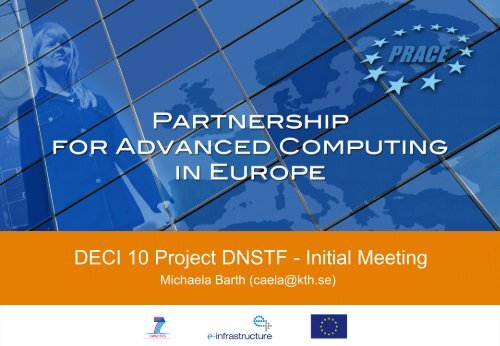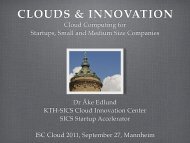DECI 10 Project DNSTF - Initial Meeting - PDC
DECI 10 Project DNSTF - Initial Meeting - PDC
DECI 10 Project DNSTF - Initial Meeting - PDC
You also want an ePaper? Increase the reach of your titles
YUMPU automatically turns print PDFs into web optimized ePapers that Google loves.
<strong>DECI</strong> <strong>10</strong> <strong>Project</strong> <strong>DNSTF</strong> - <strong>Initial</strong> <strong>Meeting</strong><br />
Michaela Barth (caela@kth.se)
The Partnership for Advance Computing in<br />
Europe is the European HPC Research<br />
Infrastructure<br />
PRACE enables world-class science through large scale simulations<br />
PRACE provides HPC services on leading edge capability systems<br />
on a diverse set of architectures<br />
PRACE operates six Tier-0 systems as a single entity including user<br />
and application support<br />
PRACE offers its resources through a single pan-European peer<br />
review process<br />
PRACE is providing services since August 20<strong>10</strong><br />
The first Tier-0 system available (Jugene) was at that time the<br />
fastest Supercomputer in Europe, now replaced by JUQUEEN<br />
2
PRACE open calls<br />
Tier-0 call for PRACE regular access – open every 6 months<br />
get CPU time on one of the six PRACE Tier-0 systems<br />
Those calls are complemented by rolling Preparatory access calls, open all year<br />
round. Technical evaluations are every 3 months at defined cut-off dates.<br />
- type A(Code scalability tests); maximum allocation period is 2 months<br />
- type B(Code development and optimisation); maximum allocation period is 6 months<br />
- type C(Code development and optimisation with the support of PRACE experts);<br />
maximum allocation period is 6 months including up to 6 months expert help<br />
scaling your code for Tier-0 systems<br />
<strong>DECI</strong> (Tier-1) call for applications – open every 6 months<br />
get both CPU time and expert help for up to 6 months on one of the many Tier-1<br />
systems across PRACE partner countries.<br />
3
<strong>DECI</strong> – Tier 1 access all over Europe<br />
The amount of allocations received in <strong>DECI</strong> compares to what is available on the national level.<br />
→ <strong>DECI</strong> can be considered as an additional resource to what we already have within Sweden.<br />
<strong>DECI</strong> offers a variety of different architectures across Europe. The amount of CPU time available<br />
per <strong>DECI</strong> call is about 5% (12m CPU hours) of Lindgren@<strong>PDC</strong> which is the Swedish PRACE<br />
resource. Over subscription is typically a factor 4.<br />
<strong>DECI</strong> gives you the possibility to apply for up to 6 months PRACE expert enabling help on your<br />
applications’ scalability.<br />
Post Award obligations include a final report and acknowledgement of PRACE support.<br />
Next <strong>DECI</strong> call: <strong>DECI</strong> 11 will open May 6 th and close June <strong>10</strong> th.<br />
Computing access from November 1 st 2013.<br />
4
<strong>DECI</strong> Workflow<br />
<br />
Experts from home site and exec site will be assigned to each<br />
accepted <strong>DECI</strong> projects.<br />
<br />
Home sites will need to arrange the initial meeting (visit/telcon) with<br />
the PIs of the accepted <strong>DECI</strong> projects and explain all the necessary<br />
information.<br />
<br />
Home sites should report the outcome/progress after the initial<br />
meeting with PIs.<br />
<br />
Exec sites will inform the <strong>DECI</strong> users when their assigned systems<br />
are available for their usage (after accounts are setup by WP6).<br />
<br />
Exec sites should help users to install the software required which<br />
are not available on the assigned systems.<br />
<br />
Enabling sites should start the enabling assistance as soon as<br />
possible and enabling experts should work in the close collaboration<br />
with <strong>DECI</strong> users.
<strong>Initial</strong> <strong>Meeting</strong><br />
• X.509 Certificate (e.g. Terena e-Science)<br />
• TTS: the PRACE support system of users (TTS)<br />
• Available User Documentation<br />
• Accessing the exec site and PRACE Common<br />
Production Environment (PCPE)<br />
• Accessing CPU accounting information via DART<br />
• Final report and data collection<br />
• Enabling help
X.509 Certificate<br />
You need a valid certificate that you can use within PRACE:<br />
http://www.prace-ri.eu/Certificates-FAQ<br />
Currently the easiest way to get such a certificate is to go to<br />
https://tcs-escience-portal.terena.org/<br />
and request a Terena e-Science certificate.<br />
If your university is connected and your personal identification flag in the<br />
universities database is set, you'll get one immediately.<br />
Otherwise: any standard X.509 certificate of a CA in the IGTF will do.<br />
Please send the DN of the certificate to me afterwards so I can enter this<br />
information in our LDAP tree.
Ticket Trouble Shooting<br />
• Primary user interface via web-interface:<br />
https://tts.prace-ri.eu/index.html<br />
Secondary interface via email: support@prace-ri.eu<br />
• Users should submit their queries to the PRACE TTS<br />
directly (rather than send to a given person).
Available user documentation<br />
• PRACE Best Practice Guide:<br />
http://www.prace-ri.eu/Best-Practice-Guides<br />
• PRACE User Documentation:<br />
http://www.prace-ri.eu/User-Documentation<br />
• Training Portal http://www.training.prace-ri.eu/<br />
with many hours of video training material available
Access to the exec site<br />
http://www.prace-ri.eu/Interactive-Access-to-HPC<br />
Exec-site: Not assigned yet, currently assume<br />
HeCToR@EPCC (a Cray XE6 system like Lindgren)<br />
assigned Core-h (standardized) 8,437,500 (<strong>10</strong>0%)<br />
(corresponds to 6750000 on a Cray XE6)<br />
Access details and specific Best Practice Guides<br />
Exec site should provide you with local Allocation Policy
PCPE<br />
PRACE Common Production Environment:<br />
http://www.prace-ri.eu/PRACE-Common-Production<br />
$ module load prace<br />
Common workspace set-up:<br />
$PRACE_ARCH – Architecture of local site<br />
$PRACE_HOME – The home directory (in PRACE GPFS if installed<br />
$PRACE_DATA – User’s data directory (in PRACE GPFS if installed<br />
$PRACE_SCRATCH – Local scratch directory
CPU accounting information: DART<br />
• DART http://www.prace-ri.eu/Accounting-Report-Tool<br />
• DART documentation still on DEISA site:<br />
http://www.deisa.eu/usersupport/user-documentation/deisa-accounting-report-tool<br />
• (Not all centers automized yet: data added by hand<br />
once a month.)
End of <strong>Project</strong> and Final Report<br />
• The final reports are expected to be submitted within 3<br />
months after the project completion.<br />
– Independent from eventual extensions!!<br />
– Template will be provided. (2-4 pages)<br />
– e.g Template for <strong>DECI</strong>7:<br />
http://www.pdc.kth.se/~caela/<strong>DECI</strong>/Guidelinesfinalreport.pdf<br />
http://www.pdc.kth.se/~caela/<strong>DECI</strong>/<strong>DECI</strong>-template-report.doc<br />
• Data should be collected within 3 months after the<br />
project completion.
Enabling help<br />
• T7.2-2IP (<strong>DECI</strong> application support) can provide to help with<br />
enabling/optimising their applications.<br />
– help <strong>DECI</strong> users to get access to their assigned Tier-1 systems<br />
– Providing assistances with porting code to the systems.<br />
• Applications enabling for the accepeted <strong>DECI</strong> projects which require more<br />
than 1 month enabling work in their application forms.<br />
– The enabling work is usually 1-6 months which involves performance<br />
optimisation, scalability enabling, and other parallelisation related<br />
technical work.<br />
• Support if there is any request from <strong>DECI</strong> projects, as informed by WP2.<br />
(WP2 is responsible for the <strong>DECI</strong> projects progress tracking.)<br />
• Efforts needed for this <strong>DECI</strong> project confirmed with PI?
Enabling procedure<br />
The assigned expert at the exec or home site:<br />
• Assures that user(s) have their accounts<br />
• Installs the requested software if these are not available at the exec<br />
site<br />
• Helps the user(s) to compile and run their code(s)<br />
• Works on the code parallelization, scalability and optimization if<br />
requested in the application form and indicated in DPMDB<br />
15
PRACE upcoming calls<br />
Tier-0 Preparatory access (PA) call is constantly open, but next cut-off date will be<br />
3 rd of June!<br />
It will feature additional 150 PMs of expert help to scale your code for Tier-0. These<br />
efforts are leftovers reactivated from the first implementation phase of PRACE<br />
(1IP). They have to be spent until December 2013.<br />
Extra-special for those interested to test a MIC architecture:<br />
The 2IP Prototype system EURORA at CINECA (Intel Sandy Bridge, 16 GB DDR3,<br />
1600 MHz) will be upgraded with Intel Xeon Phi cards, so that 64 of its nodes will<br />
have Xeon Phi cards inside (the other 64 have already Kepler GPU cards) and will<br />
be one of the PA systems available.<br />
CINCECA will run a Xeon Phi Summer School 8-13 of July.<br />
Those interested should also check out the PRACE Intel Xeon Phi BestPractice Guide<br />
currently being improved.<br />
16
Preparatory Access A,B,C<br />
Proposals for Preparatory Access only undergo technical assessment. This<br />
assessment is forwarded to the Board of Directors that makes the decision of<br />
allocations.<br />
Applicants will be promptly informed about the outcome of their application.<br />
The allocated resources are based on the recommendations of the technical<br />
reviewers, available resources and the Board of Directors prioritization, and may differ<br />
from those requested.<br />
If expert support has been requested, applicants will be contacted by the assigned<br />
expert.<br />
17
PRACE 8 th call: Tier-0 access March 2014 – March 2015<br />
PRACE 8th call for applications will open in September 2013.<br />
More information and application form can be found at:<br />
http://www.prace-ri.eu/Call-Announcements<br />
– Local experts can help you with the application form:<br />
– <strong>PDC</strong><br />
• Michaela Barth caela@kth.se<br />
– NSC<br />
• Chandan Basu cbasu@nsc.liu.se<br />
• Soon-Heum "Jeff" Ko sko@nsc.liu.se<br />
– HPC2N<br />
• Mikael Rännar mr@cs.umu.se<br />
• Jerry Eriksson jerry@cs.umu.se<br />
18
Tier-0 application procedure<br />
Guide for Tier-0 application procedure:<br />
http://www.prace-ri.eu/How-to-apply<br />
Proposals have to be submitted before the call deadline to be included in the peer<br />
review process. After submission, proposals can still be unsubmitted, edited and<br />
submitted again.<br />
PRACE Peer review: includes both technical and scientific assessment.<br />
If the reviewers have queries and/or raise issues regarding a proposal, the reviewer’s<br />
report will be sent to the applicants for an opportunity to respond, correcting any<br />
factual inaccuracies or providing any necessary further information in response to<br />
issues that the reviewers may have raised.<br />
Post Award obligations include a final report and acknowledgement of PRACE<br />
support.<br />
19



